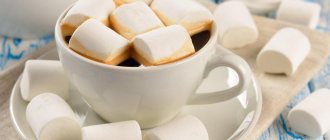There is medicine in the spoon, poison in the cup. Ancient physicians applied this admonition not only to healing infusions, but to food and drinks. Coffee provides a powerful illustration of this ancient wisdom. In moderate doses, the drink gives vitality to the body, clarity of spirit and good mood. If you get too carried away with tasting, you may experience an overdose of coffee. What kind of attack is this, what are its symptoms and how can you cope if you couldn’t resist the temptation and consumed too much of the aromatic drink?
How coffee affects the body
The composition of coffee beans is unique, and it is this that explains how a person feels after drinking the drink. The beans contain a natural biostimulant - caffeine, which gives vigor and freshness of thoughts. In addition, the composition contains proteins, amino acids, and polysaccharides, which are necessary for health.
But everything should be in moderation. If you drink a lot of coffee at once, the body will begin to malfunction, and signs of an overdose of caffeine and other active substances will appear.
It has been proven that a person whose body is relatively healthy by drinking coffee in moderation receives benefits. What does coffee do?
- It has a stimulating effect on brain activity, which speeds up thinking.
- Speeds up the metabolism in the body, which helps with weight loss, and in principle is good for the body.
- A person who drinks coffee is able to process the information received faster.
- General muscle tone increases after a cup of coffee.
- Hormones that are responsible for vigor and pleasure - dopamine, adrenaline and serotonin - begin to be produced more actively.
- Digestion improves.
- Blood circulates more actively.
The beneficial effects can only be felt with moderate consumption of the drink and using only natural grains for brewing. What happens if you drink a lot of coffee?
Is drinking a lot of strong coffee every day beneficial or harmful?
Coffee comes in various preparations. Its effect on the body directly depends on this. Also take into account the manufacturer, since the composition of the coffee plays an important role. If we talk about the benefits of this product, then it is worth excluding powdered instant drinks.
Not only do they have a lower caffeine content, but their beneficial properties are also significantly reduced. It is also impossible to call instant coffee absolutely useless or harmful, but it will not produce the desired effect. After all, a significant share in its composition is given to synthetic additives.
Below we will talk about natural coffee.
Beneficial properties of coffee
- This is an excellent remedy for raising blood pressure, so hypotensive patients need it.
- Coffee contains antioxidants , which significantly improve immunity, slow down aging (!) and increase the overall performance of the body.
- This element also reduces stress in the body when taken regularly. True, the question is a little controversial. There is a theory that to do this you need to drink at least 5 cups in a row, and this will have a negative impact on the nervous and cardiac system.
- Don't forget about the minerals, vitamins and proteins that scientists discovered in this aromatic drink.
- It contains kafeol, which cleans blood vessels and improves their permeability, and also eliminates cholesterol.
- Brain performance increases and memory improves with constant intake of such a drink. Because it contains such essential polysaccharides . By the way, the brown color of the grains is also their merit.
- For athletes and those who simply engage in physical activity, it will help eliminate muscle pain.
- And to cheer up before a serious workout, it is recommended to drink two cups of strong coffee.
- This is a diuretic drink. It also prevents the accumulation of fats in the body. Therefore, coffee helps fight excess weight.
- And this also entails prevention of edema and kidney stones.
Important: For men, drinking coffee every day in reasonable quantities is beneficial for potency. It has been noted that coffee lovers rarely have problems with it, even at an advanced age.
Aromatic coffee helps you perk up in the morning
- By the way, for healthy people, caffeine acts as a preventive measure for diseases of the cardiovascular system.
- Do not forget that this is the most powerful natural stimulant, which helps to recharge your energy . Thus, wake up and increase efficiency.
- If you drink one cup of coffee every day, you will receive complete protection against possible Parkinson's and Alzheimer's diseases in the future.
- It is also given first place in the prevention of type 2 diabetes.
- If you think that caffeine has a negative effect on your teeth, then you should reassure yourself. This drink, on the contrary, reduces the activity of harmful microorganisms. Thus, it protects against caries. Just remember to drink it without sugar.
- Moreover, coffee prevents the formation of cancer in the mouth and throat.
- If you suffer from allergies, then coffee will help reduce its symptoms, or rather outbreaks. Caffeine reduces the production of histamine, which provokes allergic reactions.
- Caffeine fights liver cirrhosis by as much as 20%. Paradoxically, coffee is indicated for those who are addicted to alcohol.
- And also for smokers, especially heavy smokers, since this drink eliminates the negative effects of nicotine on the body.
- Coffee increases the selection of gastric juice , which is indicated for people with low stomach acidity.
Important: Coffee prevents the formation of cancer. Moreover, the proportions depend directly on the amount of coffee drunk per day. Scientists have found that heavy coffee drinkers (that is, those who drank at least 5 cups a day) are more than 50% less likely to develop breast cancer!
As you can see, there are positive aspects and benefits from such a drink. But we are talking about natural coffee and for the optimal dose. That is, no more than 2 cups per day. By the way, various additives affect its benefits. But now let’s touch on an important aspect: what negative consequences does coffee bring to us when constantly consumed in large quantities.
Natural coffee is not only tasty, but also healthy
Negative, harmful sides of the coffee drink
- Coffee is recognized as a narcotic substance, which occupies a place of honor in terms of the scale of causing addiction . Moreover, people can actually experience similar symptoms, indicating a lack of the necessary substance. These include dizziness, vasodilation, irritability, apathy and weakness, and even fever. Not all signs will be immediately visible, but they may appear to some extent.
- But this is not the only similarity with a narcotic substance - caffeine creates an illusion. See, you drink the first cup and get a burst of energy. But after removing caffeine, the body not only returns to its previous state, but even drops to a lower level. Therefore, in order to feel normal, you need to drink a lot of coffee often.
- The most acute problem that coffee creates is dehydration . Let us repeat that coffee simulates the functioning of the urinary system, increasing its activity several times. But this also leaves the body with the necessary moisture. Therefore, it is worth taking care of additional fluid intake into the body.
- Especially, the situation worsens when using large dosages. The opposite effect occurs and fluid begins to accumulate, causing swelling.
- Coffee washes away calcium! Moreover, he does not even allow it to be absorbed. Therefore, coffee is contraindicated for those who suffer from bone ailments and have problems with the vascular system. The fact is that a lack of calcium destroys not only tooth enamel and bone tissue, but also draws out their elasticity from blood vessels.
- Don't forget about the important elements zinc, potassium and phosphorus. The latter substance also plays an important role in the health of teeth and bones. But potassium is necessary for our nervous system and water-salt balance for the entire body to function normally. Zinc also takes care of the condition of our teeth, hair, skin and bones.
Strong coffee removes calcium from the body
- By the way, teeth also suffer from external characteristics. After all, coffee changes their color, turning them yellow and even brown. That is, you can forget about a snow-white smile. Even regular teeth cleaning cannot always cope with this problem.
Important: This drink is strictly prohibited for pregnant women! The fact is that it promotes the tone of the uterus and increases the possibility of miscarriage by more than 2 times.
- Coffee speeds up metabolism and the production of gastric juice. It is for this reason that it should be drunk with caution in case of diseases of the gastrointestinal tract. Drinking a cup of coffee on an empty stomach is contraindicated! After all, there is a huge load on the intestines, which will cause the development of gastritis and even ulcers.
- Caffeine can relieve heartburn by visually relieving the symptoms. But here again there is a similarity in it with a narcotic substance, since this same heartburn is caused by excessive intake of coffee. The situation is especially aggravated when taking the drink in the morning on an empty stomach.
- Coffee also calms the nervous system and dilates blood vessels in the brain. But it only looks good if you take the proper amount per day. If you overindulge in coffee, then sudden and severe migraines will start to haunt you.
- And if you consume such a drink after lunch, without controlling the time and dose of its intake, then you can also develop chronic insomnia .
- Everyone has repeatedly heard that caffeine is prohibited for heart disease. This is true and undeniable, because coffee increases your pulse and heart rate, and also increases your blood pressure by several units. All this puts additional stress on the heart. And the production of adrenaline can even provoke a heart attack or stroke.
Train yourself to drink coffee only with breakfast to eliminate the negative impact on your stomach
- A large load falls on the kidneys, which, under the influence of caffeine in large doses, produces large amounts of cortisol. And it causes malfunctions of the thyroid gland. And now it can provoke hormonal imbalances in the body, which can lead to obesity, and not just excess weight. But this only applies to frequent and large coffee consumption.
Important: The thyroid gland expresses its dissatisfaction with coffee through brittle nails, oily or excessively dry skin, and hair loss.
- Large doses of coffee, and even in combination with alcohol, only create a huge load on the liver. After all, she has to work continuously to neutralize and remove all poisons from the body.
- It has also been noted that caffeine reduces sensitivity and testosterone production. And this reduces libido and sensations from sexual intimacy. By the way, this also affects the quality of the process.
- Coffee causes hallucinations, both visual and auditory.
- Next to them there is also trembling in the hands and frequent dizziness. This happens both with constant intake of large amounts of coffee, and during the absence of caffeine for some time. That is, the body begins to protest.
- The mental side suffers - there is constant fatigue and apathy, as well as irritability and even anger. This worsens when the body has not received the required “dose” of caffeine.
Coffee in large doses and when consumed systematically is addictive
What happens if you drink a lot of coffee at once?
After drinking too much coffee once, a person begins to feel strange. The sensations are unpleasant and are associated with the accumulation of caffeine in the body. The action of the biostimulant begins approximately 15 minutes after drinking the drink. The peak is reached after forty minutes to an hour, and then begins to slowly subside.
It will take 4 to 6 hours for the caffeine resulting from drinking one cup of coffee to be completely neutralized. The interval between consumption of the drink should be at least 4 hours. What happens if you drink too much coffee in a row? There will definitely be an accumulation of excessive amounts of caffeine in the body, that is, an overdose.
Everything is good in moderation
The passion for an invigorating drink sometimes goes beyond reasonable boundaries. Due to lack of control, the passion for coffee is completely absorbing and difficult to stop. Taking a large dose of caffeine gives you incredible energy, but the result can be disastrous.
There are two variants of drink abuse: taking a large number of servings in a short period of time of the day and systematic daily excessive consumption for several weeks (months). It doesn’t matter if a coffee lover drinks a lot of espresso, Americano or latte. What matters is the amount of coffee used for preparation or the dose of caffeine.
Overdose symptoms after drinking large amounts of coffee
If you drink not one, but several cups of espresso in a short period of time, the following symptoms will appear:
- trembling in hands;
- too fast heartbeat;
- the blood vessels of the brain will sharply narrow, you will feel tired, weak, and even fainting is possible (by the way, some people mistake such symptoms for a lack of energy and aggravate their situation by taking another portion of the biostimulant);
- possible diarrhea and nausea;
- dehydration, symptoms of which include dry mouth, confusion and dizziness;
- breathing becomes rapid and shallow, a feeling appears as if there is not enough air;
- a person begins to sweat even without physical activity.
You need to know moderation in everything. If you drink coffee and experience at least one of the above-mentioned sensations, then under no circumstances should you repeat the serving. As already mentioned, often this symptomatology is perceived by people as a demand from the body to cheer up.
Drawing the line
Consuming coffee within reasonable limits undoubtedly has a number of health benefits for most people.
On the other hand, excessive consumption of highly caffeinated drinks can lead to side effects that interfere with daily life and cause serious health problems. An overdose of caffeine is also dangerous.
While rates may vary from person to person, research into the effects of high caffeine consumption proves that more is not better.
To reap the benefits of caffeine without the unwanted side effects, be realistic about your sleep, monitor your energy levels and other factors that may be affected, and reduce your intake if necessary.
Regular alcohol abuse
We told you what symptoms appear if you drink a lot of coffee. What will happen to the body if you constantly “sit” on this aromatic drink? Many people really don’t understand that the body is in danger, and drink several mugs of coffee a day, pouring a new one almost as soon as the previous one runs out.
If you abuse caffeine daily, the central nervous system will be overloaded to the limit. The body will begin to work in a constant state of stress, and stable stimulation of hormone production (adrenaline, dopamine and serotonin) will lead to exhaustion of the nervous system.
In most cases, regular coffee abuse leads to addiction, when a cup of the drink is simply necessary, not to cheer you up, but to feel “good.”
What happens if you drink a lot of coffee consistently? The body's reaction to the drink will be the opposite of what it should be with moderate consumption.
Lethal dose of coffee for humans in cups
30 ml of coffee drink contains 70-180 mg of caffeine, which does not negatively affect the condition of the human body. The permitted dosage of coffee is calculated based on a person’s body weight. The lethal dose of coffee in cups is 90 for a woman weighing 60 kg.
Lethal dose of coffee for a person at one time
What is the lethal dose of coffee? 200-300 mg per 1 kg body weight . The drink is prepared in a concentrated form with an unpleasant taste. For this reason, a person is not able to drink a lethal dose of coffee per day at once.
The reaction to the resulting overdose manifests itself in the form of: nausea, vomiting, dizziness, excessive weakness, rapid heartbeat. Each sip worsens your overall health.
You will like the article: “ The benefits and harms of coffee for the human body – natural or instant? ".
Lethal dose of coffee for a teenager
Children are strictly prohibited from drinking coffee and caffeinated drinks. The combination of coffee and energy drinks leads to severe intoxication and increases the risk of death. For a teenager, the permitted dosage is 200-400 mg of coffee. In cups - no more than two per day, but not in a row and not after smoking, alcohol, or energy drinks.
We recommend: What to do if a child or adult is poisoned by tangerines - symptoms
If a teenager takes a lethal dose of coffee, it is necessary to call an ambulance. Signs of poisoning will be eliminated more quickly in the hospital, reducing the risk of death and negative consequences.
Symptoms of coffee addiction
If a person consistently drinks coffee in large quantities, then over time he will begin to notice unpleasant symptoms:
- Without coffee, the body simply refuses to work normally: there is no vigor, there is constant fatigue, confusion of thoughts.
- Even with such “fatigue” you will suffer from insomnia.
- Your appetite will become poor.
- The person will be constantly irritated.
- Chronic diseases will worsen due to the weakening of the body by caffeine.
- Dizziness will become habitual, trembling in the hands will become stable.
Prevention
Intoxication can be prevented. It is enough to know about preventive measures. It is not recommended to experiment with the body. You cannot drink 2 mugs of drink in a row. Natural black coffee is prohibited for people with high blood pressure and pathologies of the cardiovascular system. You should not give coffee to children.
You will like the article: “ What will happen if a man and a woman drink a lot of coffee?☕ .”
How many cups of coffee per day is considered normal for a person? The permitted dose of coffee is 100 mg, which is equivalent to 200 ml of brewed coffee beans or 60 ml of espresso.
If you look at spoons, then 100 mg of caffeine is contained in 3 tsp. with a heap of ground coffee beans or 2 tsp. soluble. If you consume an invigorating drink in moderation, then a lethal dose of coffee will not form in the body.
What are the dangers of drinking too much coffee all the time?
We described the first symptoms indicating an excess of coffee in the body. If you do not pay attention to the body’s signals and continue to drink the drink in the same way, serious consequences may arise:
- The pressure will begin to rise steadily. It cannot be normalized by taking a pill, because caffeine neutralizes the effect of the medicine.
- The risk of developing cardiovascular diseases increases. Our “engine” already works quickly, and if it is also stimulated, forcing it to beat even faster, then we can get a heart attack as a “token of gratitude.” This is the worst consequence of sustained caffeine abuse.
- Headaches will begin to bother you. Moreover, the migraine will be so severe that not a single drug will help. Constantly experiencing severe pain, a person simply will not be able to work normally; he will feel internal anxiety, tension and irritability.
- Glaucoma develops.
- The vessels narrow, which is bad when the heart is working vigorously and the blood flow is active.
- Coffee aggravates the situation for people with gastrointestinal diseases.
- Over time, your teeth will turn yellow and your skin will become looser and grayer.
- Your nails will peel and your hair will fall out.
It is worth paying attention to such factors under which it is not recommended to drink coffee:
- drinking a drink before or after drinking alcohol - intoxication will become even stronger;
- drinking coffee along with nicotine is a high risk of developing hypertension;
- coffee and sedatives are contradictory substances, which means that the sedative simply will not work, because it is neutralized by caffeine.
The worst consequence of excessive coffee consumption is death as a result of exhaustion of the body due to stable heart failure and respiratory failure.
Daily Excessive Consumption
It is impossible to accurately determine the safe daily intake for each person; it is strictly individual and depends on a number of factors. But there are general recommendations on the permissible amount. Drinking three cups of coffee per day for a relatively healthy person will not lead to a worsening of the condition.
But there are coffee lovers who drink this drink more often. They constantly, for a long time, consume more than six servings of the invigorating composition per day. They need a daily intake of a large dose of caffeine not for vigor, but to maintain a normal state. Gradually, addiction forms; if you do not drink the traditional portion of coffee, discomfort, a feeling of emotional dissatisfaction occurs, mental performance decreases, and headaches occur.
Constant intake of excess caffeine leads to the appearance of negative symptoms:
- insomnia;
- cardiopalmus;
- irritability;
- high blood pressure;
- decreased performance;
- loss of appetite;
- darkening of teeth;
- dehydration of the body;
- bone fragility due to “leaching” of calcium.
I drank a lot of coffee and feel bad: what should I do?
You need to immediately begin removing caffeine from your body before more serious, life-threatening symptoms begin to appear. How to do it?
- The first step is to rinse the stomach to remove the remaining coffee before the substances from it are absorbed further.
- Next you need to take a sorbent and a saline laxative. Activated carbon is required; it will help remove unabsorbed remains of the drink.
- If a person has lost consciousness or started to delirium, there is no time to waste on “pushing” drugs into him. In this case, you need to quickly deliver the caffeine poisoned person to intensive care.
If the symptoms are not too obvious, you just feel a little uneasy, trembling appears, then after taking the pills you need to eat a hearty meal. It should be fatty food, cutlets, hamburger, thick soup are suitable.
If you want to get rid of coffee addiction, then give up the invigorating drink altogether for a long time. If you like its taste and your mouth starts watering when the aroma of coffee comes from the next apartment, brew chicory. The taste is quite similar, but this drink will not harm you.
We talked about what happens if you drink a lot of coffee. Think about your health, drink this aromatic, invigorating drink within normal limits, if there are no contraindications.
How to help yourself if you overdose
Not all lovers of an invigorating drink limit themselves to two or three cups. First, a morning portion, then many times a day - “to recharge”, and in the evening again to improve performance. And situations often arise when work needs to be done urgently, but there is not enough energy. Here, to give vigor, a loading dose of the product is drunk without thinking about possible harm.
At some point, when things get bad, a person begins to realize that he has had too much coffee: his heart flutters, a throbbing headache, tinnitus, and nausea appear. It is impossible to immediately take a lethal dose of caffeine in a drink, but it is easy to bring the body to a painful state.
In such a situation, everything must be done to reduce the concentration of the alkaloid. The most accessible and simple remedy is water, drink a few glasses of it. This will flush the stomach and prevent dehydration.
If you don't like pure water, take non-alcoholic beer; the hops contained in it will reduce the stimulating effect of caffeine. If you don't have this drink, drink a glass of milk. Drinking large amounts of fluid helps dissolve the alkaloid and facilitate rapid filtration by the kidneys.
If your health allows, eat fruit or have a solid meal, this will give you strength. Bananas are especially beneficial due to their high potassium content.
Open the windows indoors or take a walk outside. Fresh cool air improves the condition of poisoning.
Coffee composition
The product contains various elements, depending on the type of drink. The bulk of coffee beans is presented in the form of a small amount of proteins, fats and carbohydrates, a complex substance called tannin, which binds everything into a single mass. It contains a small amount of trace elements, insoluble fibers and a component that has a strong effect on the body - caffeine. The last component varies in different types of coffee from 1 to 2%, and in instant coffee it is usually higher.
The standard set, as in any product, of proteins, fats and carbohydrates interests us less, because more and more people drink a brewed drink rather than chew ground beans. A person reacts more to a substance from the class of psychostimulants or alkaloids. It comes in the form of caffeine. It is this that affects many organ systems, leading to unexpected reactions, and in some cases, severe symptoms of coffee poisoning.
Withdrawal syndrome
“While not officially recognized as a drug, caffeine nevertheless alters mood, forms a physical addiction, withdrawal from it causes withdrawal symptoms, and a certain part of the population develops addiction. Coffee drinking is a stable and orderly form of drug-induced self-administration behavior that is easily analyzed through carefully designed experiments.
Although the phenomenon of caffeine withdrawal has been described before, our report shows that the incidence of caffeine withdrawal syndrome is higher (100 percent of those studied), the daily dose at which it occurs is lower (with the amount of caffeine approximately equal to that of one cup of brewed coffee or three cans of coffee). caffeine-containing soft drink), and the range of symptoms observed is wider than previously thought (headache, fatigue and other dysphoric mood changes, muscle pain and stiffness as in the flu, a feeling of nausea sometimes to the point of vomiting, and caffeine cravings).
Now let's look at the bigger picture. Let's assume that the supply of caffeine to America suddenly stops, and tomorrow there will be no more caffeine. Or that for some reason we will have a holiday called National Caffeine Free Day, like No Smoking Day. Since about 80 percent of Americans take this substance daily, the results suggest that 125,000,000 people will walk around with headaches and 32,000,000—a number equal to the population of California—will experience significant distress or functional impairment.
The DSM-5 (significantly revised compared to the DSM-4), which was released in 2013, did include a diagnosis of “caffeine withdrawal”, which placed this substance on a par with other drugs - cocaine, nicotine and opiates - syndromes withdrawal disorders are recognized by the DSM as independent diagnoses. A diagnosis of caffeine withdrawal means that when caffeine consumption is stopped or reduced, a person may develop a range of symptoms such as headache, fatigue, irritability, depressed mood, nausea and muscle pain."
Insomnia and anxiety
“Sleep disturbance is a well-known side effect of caffeine, but its manifestations vary greatly. Some people can drink coffee until late in the evening, then lie down and sleep like a baby. Others should stop just after noon, otherwise they will grind their teeth at night, suffering from palpitations and a non-stop stream of thoughts. And here’s another mystery of caffeine: it usually works great to relieve us of drowsiness, but... in some cases it makes it worse.
Amy Wolfson (professor of psychology at the College of the Holy Cross, board member of the National Sleep Foundation, author of The Woman's Book of Sleep - T&P) told me that she is particularly interested in the dependence of high school students on caffeine and the connection between caffeine use and a generation of sleepy teenagers who scientists began to carefully study. In 2006, researchers from Maryland found a link between teens' caffeine use, their sleep problems and their feelings of tiredness in the morning. When Wolfson and a colleague began studying caffeine use among high school students, they encountered a similar situation. Students in the high caffeine consumption group—those who drank coffee, energy drinks, and soda—reported greater daytime sleepiness and a desire for an energy boost with caffeine to get them through the rest of the day.
Insomnia is, of course, painful, but caffeine has another, more unpleasant property: it causes anxiety in sensitive people. This disease is surprisingly common. Take the statistics for any year and you'll find that 40,000,000 American adults suffer from clinically significant anxiety, making it the most common form of mental disorder. John Greden from the University of Michigan has written extensively about the connection between caffeine and anxiety. He noted that while people's susceptibility varies, very large doses of caffeine cause anxiety in almost anyone.
In April, Wrigley introduced Alert, a caffeinated energy gum. The advertising campaign was well organized and the product received a lot of attention. But caffeinated gum has a serious drawback - it can easily be confused with the decaffeinated version. In May 2011, more than 600 primary school students in South Africa fell ill after consuming Blitz caffeinated energy gum. They collected it from a nearby farm where it had been dumped due to its expiration date.
One way or another, it was chewing gum that finally pushed the FDA into action. Taylor made the announcement Monday. On Wednesday, delegations from Wrigley and Mars visited him. A week later, on May 8th, Wrigley announced that it was removing the product from the market.”











